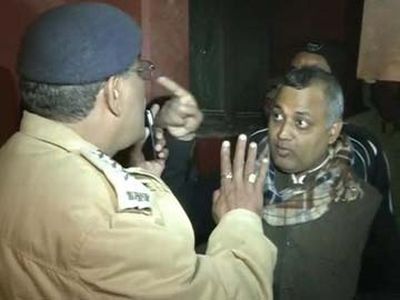 Somnath Bharti’s unlawful demand for a police raid at midnight on a house full of women, many of whom were African nationals, seemed to be based on the view that given the colour of their skin, their deeds must be black as well, notes Geetanjali Krishna.
Somnath Bharti’s unlawful demand for a police raid at midnight on a house full of women, many of whom were African nationals, seemed to be based on the view that given the colour of their skin, their deeds must be black as well, notes Geetanjali Krishna.
A few years ago, a young African man was found dead on one of the roads in our colony. A watchman discovered his body early morning. When I asked him later if he had seen or heard anything that night, he said: "it has to have been drug-related... These people are all like that only! They drink and dope and openly flaunt girlfriends -- I think they are spoiling the atmosphere of our colony!"
Later, all the neighbours agreed that the growing number of Africans staying in the villages behind the neighbourhood were a security hazard. "The fact that they have even opened their own grocery stores and beauty salons in the village, means they're here to stay..." said one gloomily.
Everyone shook their heads sadly and said that the entire neighbourhood would soon be riddled with drug pushers, pimps and worse. The mystery of the unfortunate man's death was never resolved as far as I know, not that anyone around seemed interested.
Over the next couple of months, the African presence in our insular little neighbourhood increased. "To top it all, the number of North Easterners has gone up too!" said a despairing dowager.
Taking advantage of the relatively cheaper rents in the villages behind Safdarjung Enclave, scores of youngsters from across the world were choosing to live there. The repercussions were immediately noticeable.
A local general store began selling wine and beer. Kebab and momo stands mushroomed outside the booze shop. Party-goers thronged the once-quiet colony late at night and call centre cabs began clogging up the roads.
I made the mistake of saying to my neighbours that much as I disliked the sudden spurt in traffic in our environs, it was nice to see so many young people around even in the wee hours.
"All those women that you see on the corner of our street are prostitutes," said one venomously. "Stay away from these foreigners," advised another, "they'll spoil our young boys and girls with their brazen ways..."
The local maids and cleaning ladies said that the Africans scared them. "I'd never work in their homes even if they paid me double," sniffed one.
The general consensus was that they weren't like "white" foreigners who are desirable employers. "These people are mostly as badly off as we are..." they said. Convincing them to cut any slack or give any benefit of doubt to foreigners proved impossible. Public opinion hereabouts had tarred them all with the same brush.
Till a fortnight ago, I believed that illiteracy, insularity and racial prejudice went hand in hand. That people who didn't know any better responded with fear and suspicion when they encountered people very different from themselves.
Of course, now the Aam Aadmi Party's Somnath Bharti has shown me otherwise. The IIT professor-turned law minister's unlawful demand for a police raid at midnight on a house full of women, many of whom were African nationals, seemed to be based on the view that given the colour of their skin, their deeds must be black as well.
He listened to the bigoted opinions of some locals in Khirki Extension, sought little proof, pronounced a kangaroo court-style judgment and meted his own brand of justice which entailed forcing the women to urinate in public and worse.
Even the Delhi Police rebelled against him, but AAP continues to stand firmly by him.
They say Bharti's popularity amongst the aam aadmis (and aurats) of Khirki Extension is sky-high today. He's a hero now, even amongst some men who, as the victims of his vigilantism have alleged, have often asked them what their "going rates" are.
All I can now do is hope he doesn't come to visit the aam aadmis of my neighbourhood next...
Image: Video grab shows Somnath Bharti confronting a Delhi Police official during a midnight raid at Khirki Extension in New Delhi.











